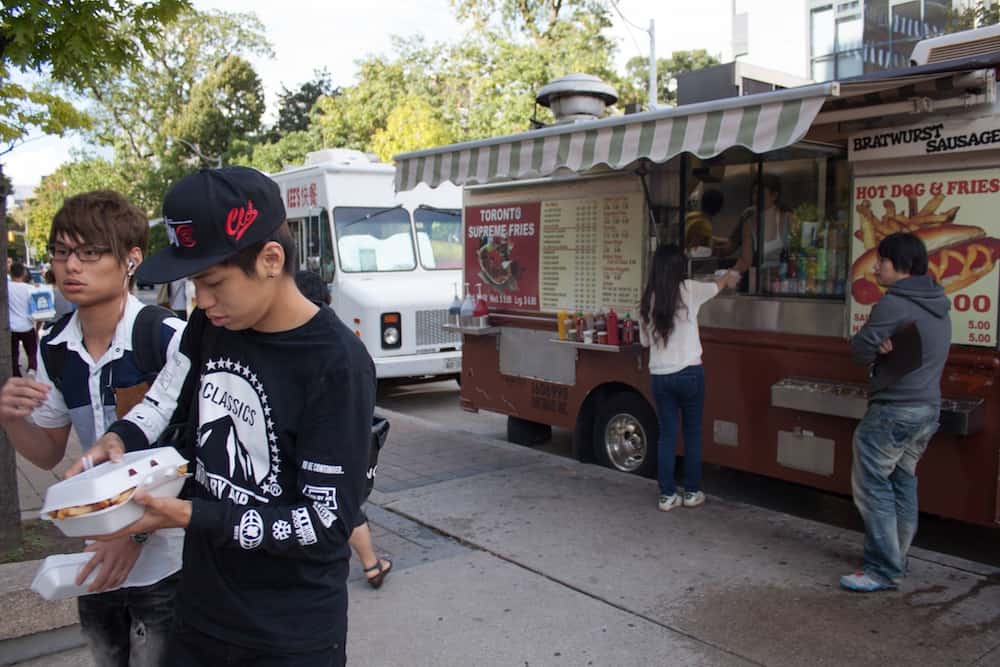As Toronto enters its second month of a pilot project involving food trucks stationed in five of Toronto’s parks, the efficiency of food truck regulation in the city is under the microscope once again.
Zane Caplansky, owner of Toronto’s first modern food truck, is critical of the project. “The whole idea of trucks in parks is stupid,” said Caplansky, who has advocated for an increase in the number of food trucks in Toronto for the past two years. He would prefer to see a study of trucks on city streets in order to observe how they function in relation to restaurants and other businesses, instead of observing them in parks, where he says they are “a waste of time and a waste of money.”
Jen Salazar, who runs the food truck for Smoke’s Poutinerie, said that she “expected more from the project, but [the revenue] is okay.” Carleton Grant, director of Policy and Strategic Support at City Hall, explained that the project was launched in parks to avoid the contravention of bylaws and surplus traffic congestion.
The bylaws governing the operation of food trucks in Toronto are strict, especially in comparison with cities such as Ottawa and Vancouver. In Toronto, the cost of a license is $400, and each worker must hold an individual license, which cost $300 each. Under the Mobile Refreshment Vehicle Bylaw, food trucks must also pay $45 per employee for a criminal-background check. In Vancouver, anyone wishing to sell food on the streets must hold a business license — which costs $50 — in addition to a permit for each mobile food vending unit. For a general street vendor, the owner is required to pay an annual sum of $1,073.29.
Tony Elenis, president of the Ontario Restaurants, Hotels and Motels Association (ORHMA) acknowledges the advantages of food trucks: they help to create jobs and build community. However, Elenis is adamant that “brick and mortar restaurants should be protected,” as he fears that allowing food trucks to sell on the streets would risk putting restaurants out of business. “Places with a comparative price point, places with a small take-out menu are most affected by food trucks,” Elenis said.
Salazar does not think that a food truck could ever cause a restaurant to close, and Caplansky maintains that there is no evidence that food trucks are a threat to other eating establishments. Salazar admits that the Smoke’s food truck does better business than its storefront, but attributes the truck’s success to the “media hype…[food trucks] are a new concept.” Caplansky emphasizes the role of the media in the positive public perception of food trucks: “Torontonians are very frustrated because they see shows like Eat St., and realize that food trucks are cool and fun… But where are they?”
Food trucks on St. George Street and Queen Street West, as well as outside City Hall and the Rogers Centre, operate under an older permit, before the number of permitted vendors was capped at 28 after a 2008 moratorium. By contrast, Ottawa boasts a total of 61 vendors, following the approval of the New Street Food Vending Program in 2012. Caplansky is concerned that the “monopoly” the older trucks have on the few locations is damaging the competition necessary for the economy to work. Elenis agrees that competition is important, but stresses that it has to be fair, and allowing food trucks to be stationed near restaurants is “just unfair.” Elenis added that food trucks are better suited to parks and festivals, and disagrees with the idea of a study of trucks on the streets “because it would be against our intentions.” Elenis said that he would be happy to see food trucks in places where there are no restaurants, such as university campuses.
Food trucks seem like the perfect solution for students who are hungry for fast, inexpensive, and tasty food, and it seems that students would like to see more food trucks, with more variety, around the university area. “I had six straight hours [of class] today, and couldn’t eat. If I could have grabbed something, maybe something healthier, I would have been grateful,” said second-year student Larissa Parker. U of T invites food trucks onto campus every Friday with the popular Food Truck Friday event.
Caplansky hopes that a new project will be under way next spring, but expects that the changes will be slow. Grant confirmed that there is research being done on food trucks in Calgary, with a view to discussing the findings and taking suggestions back to Toronto for spring 2014.


